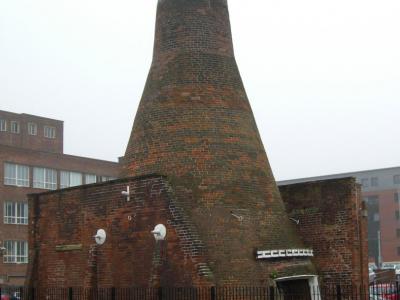
Cementation Furnace, Sheffield
The Cementation Furnace is a historic steel-making furnace in Sheffield. It is the only one of its kind surviving intact in Great Britain. Due to its historical importance, it has been designated as a Grade II listed building.
The Cementation Furnace was built in 1848. Its purpose was to produce steel for the firm of Daniel Doncasters and Sons. The furnace was used on Blister steel until 1870. Blister steel was the first type of commercially produced steel. The process in the cementation furnace left it with a blistered appearance, hence its name. The furnace remained in use until 1952.
Though there were more than 250 cementation furnaces at the time, all others have been destroyed or damaged. During World War II, the Cementation Furnace was fitted with a blackout cover as a precaution during air raids.
The furnace was restored in 1993 and is now a popular spot for visitors to Sheffield. It is surrounded by a locked, gated fence. Those who wish to enter the furnace may receive a key to the gate from the Kelham Island Museum.
The Cementation Furnace was built in 1848. Its purpose was to produce steel for the firm of Daniel Doncasters and Sons. The furnace was used on Blister steel until 1870. Blister steel was the first type of commercially produced steel. The process in the cementation furnace left it with a blistered appearance, hence its name. The furnace remained in use until 1952.
Though there were more than 250 cementation furnaces at the time, all others have been destroyed or damaged. During World War II, the Cementation Furnace was fitted with a blackout cover as a precaution during air raids.
The furnace was restored in 1993 and is now a popular spot for visitors to Sheffield. It is surrounded by a locked, gated fence. Those who wish to enter the furnace may receive a key to the gate from the Kelham Island Museum.
Want to visit this sight? Check out these Self-Guided Walking Tours in Sheffield. Alternatively, you can download the mobile app "GPSmyCity: Walks in 1K+ Cities" from Apple App Store or Google Play Store. The app turns your mobile device to a personal tour guide and it works offline, so no data plan is needed when traveling abroad.
Cementation Furnace on Map






Sight Name: Cementation Furnace
Sight Location: Sheffield, England (See walking tours in Sheffield)
Sight Type: Attraction/Landmark
Guide(s) Containing This Sight:
Sight Location: Sheffield, England (See walking tours in Sheffield)
Sight Type: Attraction/Landmark
Guide(s) Containing This Sight:
Walking Tours in Sheffield, England
Create Your Own Walk in Sheffield
Creating your own self-guided walk in Sheffield is easy and fun. Choose the city attractions that you want to see and a walk route map will be created just for you. You can even set your hotel as the start point of the walk.
Industrial Revolution Heritage Walking Tour
Steeped in history, the city of Sheffield is famed for its contribution to the Industrial Revolution, largely due to the development of stainless steel. Indeed, the “Steel City” of the United Kingdom, it was internationally renowned as a major hub of steel manufacturing during the 19th century. So much so, in fact, that George Orwell once famously referred to it as “the ugliest town in the... view more
Tour Duration: 2 Hour(s)
Travel Distance: 3.1 Km or 1.9 Miles
Tour Duration: 2 Hour(s)
Travel Distance: 3.1 Km or 1.9 Miles
Sheffield Introduction Walking Tour
Sheffield takes its name from the river Sheaf, which runs through the city. Field, of course, is an open space. The city sits at the confluence of the rivers Don and Sheaf. Don is the master stream. Its tributaries are the Loxely, Porter Brook, Rivelin, and Sheaf. There were settlements in this area as far back as 12,000 years ago.
After the Romans, settlements were Anglo-Saxon and Danish. With... view more
Tour Duration: 1 Hour(s)
Travel Distance: 1.7 Km or 1.1 Miles
After the Romans, settlements were Anglo-Saxon and Danish. With... view more
Tour Duration: 1 Hour(s)
Travel Distance: 1.7 Km or 1.1 Miles
Sheffield's Historical Buildings
Part of Sheffield’s great heritage is manifested in buildings. The presence of historical sites, some rather imposing like the Sheffield Town Hall and City Hall, presiding over the area, and the others like the Church of St Marie, somewhat hidden from view in a built-up neighbourhood, provides a colourful illustration of the city's glorious past.
Constructed over a time-span ranging from... view more
Tour Duration: 2 Hour(s)
Travel Distance: 2.9 Km or 1.8 Miles
Constructed over a time-span ranging from... view more
Tour Duration: 2 Hour(s)
Travel Distance: 2.9 Km or 1.8 Miles



